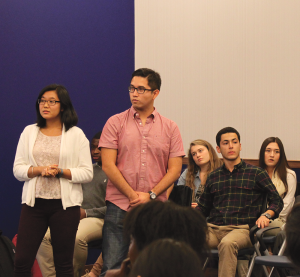
GUSA Director of Outreach Eng Gin Moe (SFS ’16) and Deputy Director of Outreach Rodrigo Gonzalez (SFS ’15) lead the Multicultural Council’s first town hall, which aimed to solicit feedback on the council’s agenda.
The Georgetown University Student Association hosted its inaugural Multicultural Council Town Hall on Tuesday in the Healey Family Student Center, soliciting suggestions for the council from members of various campus cultural groups.
Representatives of the Multicultural Council, which was created in August to facilitate communication between GUSA and cultural groups on campus, outlined their agenda for the year and invited students to participate in various working groups.
GUSA’s Director of Outreach Eng Gin Moe (SFS ’16) and the GUSA Multicultural Deputy Director of Outreach Rodrigo Gonzalez (SFS ’15) lead the council, which also includes six representatives who are leaders in their respective cultural groups.
“The whole purpose [of the Council] is to develop a constant and direct line of communication between cultural groups and the GUSA executives,” Moe said. “We are institutionalizing a commitment to cultural diversity.”
Gonzalez said that being a part of the council has helped him fulfill a personal goal.
“It stands from the fact that when I came here as a freshman, I immediately gravitated towards the Latino-Hispanic groups on campus. I felt like I was a bit of an outsider there,” Gonzalez said. As a result, he founded the GU Mexican Students Association in his freshman year. “I would be helping other groups with what I did for my own.”
The coordinators outlined the structural makeup of the committee, which consists of four working groups.
The academic working group deals with the creation and integration of multicultural topics into classes; the funding group aims to examine and reform how cultural groups are currently funded; the institutional group works to solve issues with the university including heritage funds; and the programming group helps with cross-collaboration between cultural groups and promoting active multiculturalism.
The council’s meetings will be open to all students and are scheduled to occur biweekly.
Some students in the audience raised concerns about whether or not cross-cultural interactions would actually increase following the creation of the council, while others posed questions about how cultural groups of all sizes would be equally represented by the committee. Moe said many of these issues will be minimized since the council is organized into working groups rather than being structured by cultural groups.
“The working group structure ensures cross-cultural communication, so that the individuals in a cultural group won’t just stick to that group,” Moe said.”One important thing to know in the beginning is that we will all try to support each other equally.”
GUSA President Trevor Tezel (SFS ’15) said he has high hopes for the council to resolve issues from previous years resulting from the nonexistence of such a program.
“The idea behind a multicultural council is to advocate to administrators what cultural communities traditionally haven’t had as much access to,” Tezel said.
The committee currently provides a schedule of events on Google Calendar which broadcasts events from all cultural groups so that they are not limited to just the members of a particular group.
Council leaders also discussed various initiatives, such as the creation of alternate funding structures and the autonomy of cultural groups from the Students Activities Commission, the current advisory board under which they are governed. Moe, a previous SAC commissioner, is in favor of a new cultural group advisory board.
“The nature of funding is that there is a limited amount of money for all these great groups that want to do so much,” Moe said. “Cultural groups want to do a lot of great programming, but SAC may not be the right fit for them.”














